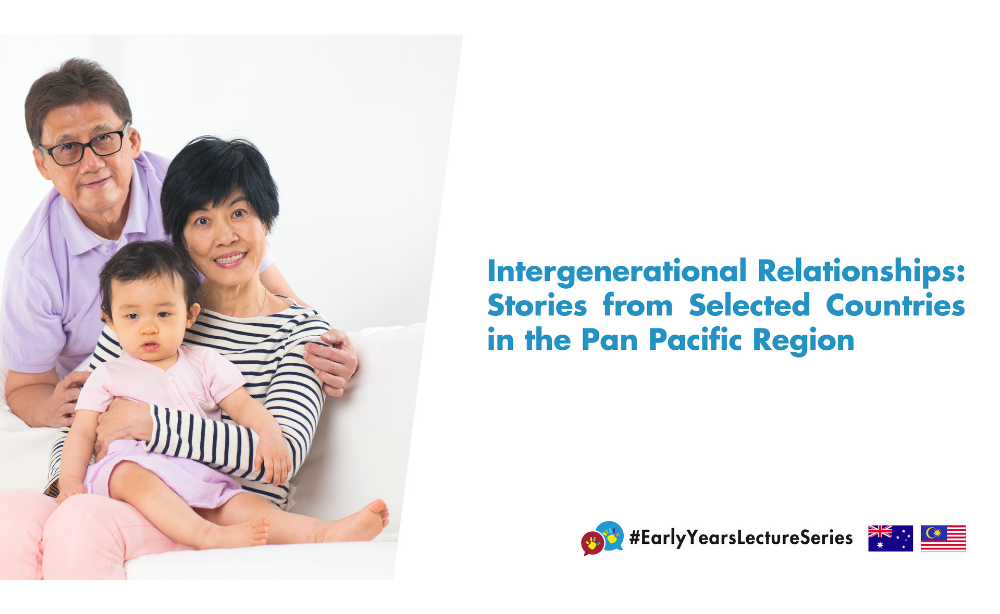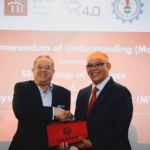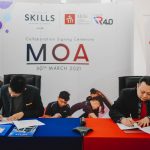SEGi Group of Colleges-Whytehouese Education Group held a very insightful webinar from their Early-Years lecture series with Dr Bonnie Yim of Deakin University Australia on ‘Intergenerational Relationships: Stories from Selected Countries in the Pan Pacific Region’ on 12 March at 10am.
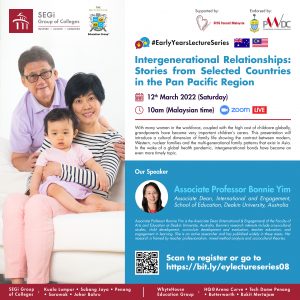
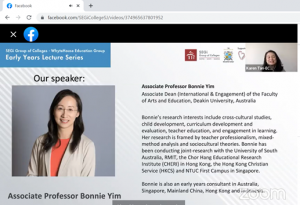
Dr Yim, who recently published a research paper on intergenerational relationships, a topic relevant to everyone in every part of the world, believes that this kind of relationship varies because of different cultural perspectives. Her research interest ranges from early childhood education policy to child development, from ecological systems to sociocultural theories, from teacher professionalism to cross-cultural and comparative research.
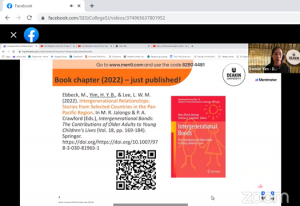
The participants were clearly very present in this very lively interactive session. Dr Yim encouraged them to share their views about intergenerational bonds within their own families, as well as their thoughts about governmental aid. She began by explaining that intergenerational relationship is the interaction between and among the first, third and fourth generations of a family and why these relationships are important, and she continued with a focus on studies done in Australia, Singapore, and Hong Kong.
She articulated that grandparents have an important role in taking care of grandchildren as many families are double-income ones now, and more women working full-time in these past decades. In this context, it is important for the government to accept and support the idea of grandparents as caregivers. Studies have shown that there is a lack of support for these grandparents as caregivers in certain countries, while there is evident financial support in Australia, Singapore and Hong Kong.
Dr Yim further shared from her research on how much money the government could save in terms of replacement costs with grandparents being the key caregivers to their grandchildren. From her studies in the Australian context, grandparents look after the young ones for approximately ten hours a week, the going childcare pay rate being AUD10 per hour.
The conclusion was that a great amount of money is being spent on childcare when grandparents are not the children’s caregivers. The study demonstrates the impact of grandparents on the economy and their wonderful contributions to society.
Dr Yim’s research aims to prove that intergenerational relationships have a great impact on the quality of life, not just of young children, but of parents, of extended families, and of society in general. She explained, with reference to Bronfenbrenner’s ecological theory, that the immediate family, the workforce, and the government, are all interlinked in playing a role in caregiving. The consensus is like that old adage, that it “takes a village to raise a child”.
Cultural values have a key role in intergenerational relationships. For example, in Singapore and Hong Kong, where there is still a strong Confucian tradition of filial piety and respect, intergenerational interactions are easily motivated and vitalised – there is a sense of inclusion based on social identity in these societies. In Asian cultures, grandparents often care for their grandchildren who will usually in turn respect and care for their grandparents when they get old.
This contrasted starkly in the study in Australia where many elderly people live in residential healthcare facilities in their older years, thus not being as accessible to their families or having the chance to be involved in the caring of their grandchildren.
Dr Yim went on to elucidate on the many ways to enhance intergenerational relationships:
At early-childhood centres:
- Childcare should be linked to age-care.
- It takes a multidisciplinary team effort to tackle this societal issue especially from workers in health, education and the social sciences, including the involvement of occupational-health therapists.
Dr Yim then shared about a project carried out in Australia prior to the COVID-19 pandemic, one which explored the impact of interactions between the young and the old in the community. A similar project done in the UK also yielded illuminating results. This was an intergenerational programme that aims to:
- provide elderly people with access to young children.
- provide joy to the elderly who may be feeling isolated.
- provide opportunities to children to engage with the elderly and understand what it means to be an older person.
- Provide opportunities for young children who do not have grandparents to experience companionship and socio-emotional support among older people.
These are even more relevant in current post-Covid-19 times when many have lost members of their families.

Dr Yim shared that in Australia, there are resources available for EC professionals and parents to support grandparents and kindship carers.
At home, parents and extended family:
- should be significant in the
- Should provide consistent and unconditional love.
- be kind, considerate, and compassionate role-models.
- should encourage grandparents to maintain social norms and cultural values through sharing and upholding these with their grandchildren.
Some examples from Dr Yim included teaching and sharing skills and knowledge with young children where they would not learn elsewhere, especially about cultural heritage, language and the mother tongue, family traditions, recipes, and countless other family values.
Dr Yim stressed that staying connected is critical, even in trying times such as this post-pandemic one that we have been experiencing.
According to research done in Australia in 2020, the elderly connect with family at least two to three times a week, for at least five to ten minutes, through social media such as Facebook and video calls. At least forty percent of the elderly know how to use use social media to connect, which is a very positive thing because learning new things is good for mental health and social wellbeing, especially for the elderly.
Dr Yim reiterated two very important messages:
- As families become smaller and as the lifespan of the elderly increases, it will become even more important to nurture and sustain intergenerational relationships.
- When planning curriculums, lessons, or conducting research, it is vital to think and plan beyond the school fence, because children learn not only in school but also at home and in the community.
Ms Karen Tan, the webinar moderator, added that grandparents play a major role in Malaysia, spending an average of ten hours a day (from information gathered through a questionnaire done in her setting). She voiced her concern that grandparents may be feeling underappreciated. She also shared ideas on how there could be resources in place to support grandparents to bring about a greater and more positive intergenerational bond. Additionally, she shared from her experience in bringing children out to old-folks homes (prior to the pandemic) where they could learn about culture, social skills, and empathy.
Both Dr Yim and Ms Tan believe very much in enhancing quality of life through ensuring physical and socio-emotional wellbeing of all, from children to their parents to their grandparents.
During the Q&A session, in response to a question asked about funding for the intergenerational programme on whether parents receive subsidies from the government to send their children to childcare, preschool/kindergartenband age-care centre, the answer was that there is government support in Australia, Singapore and Hong Kong, where grandparents are recognised and acknowledged as caregivers instead of being caregivers for free.
Then came the question of how to overcome the fact that some (if not most) grandparents have little knowledge of modern early-childhood (EC) development. In Canada, there is a course for grandparents to gain and develop skills and knowledge in the area, to use these skills and knowledge to communicate with the children’s parents about the children, instead of using them to manage the children themselves, thus bridging the generation gap and the old versus new ways of childcare caregiving. In Australia, in some cases, grandparents may need to go through some training before they can access the government’s funding, depending on context and needs.
In conclusion, Malaysia still has great room for improvement in this area, and Dr Yim encouraged research in the area to improve the quality of life for everyone involved.
It was also realised that EC courses should include the importance of extended families (grandparents, in this case) in the care of young children. Children learn at home first and foremost, and they learn in society, so the curriculum should address these learning experiences beyond the classroom.
The next lecture in this series will be ‘Teaching in Times of Crises: What Montessori Teaches us about Resilience and Flexibility’ by Professor Catherine MsTamaney on 25 March at 8pm.

